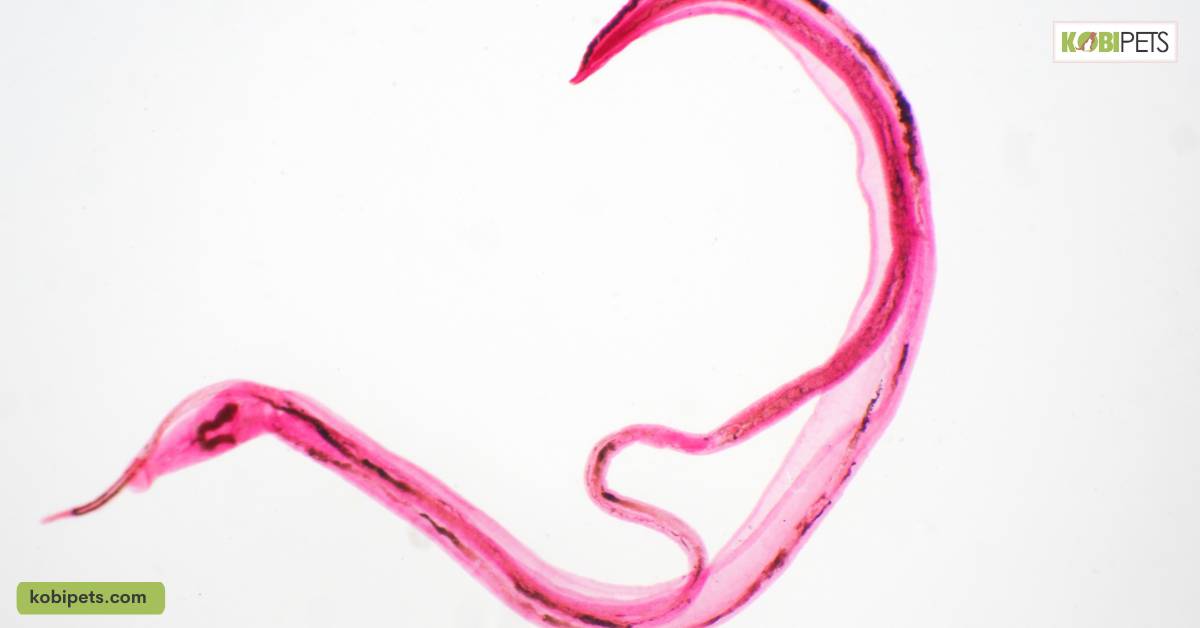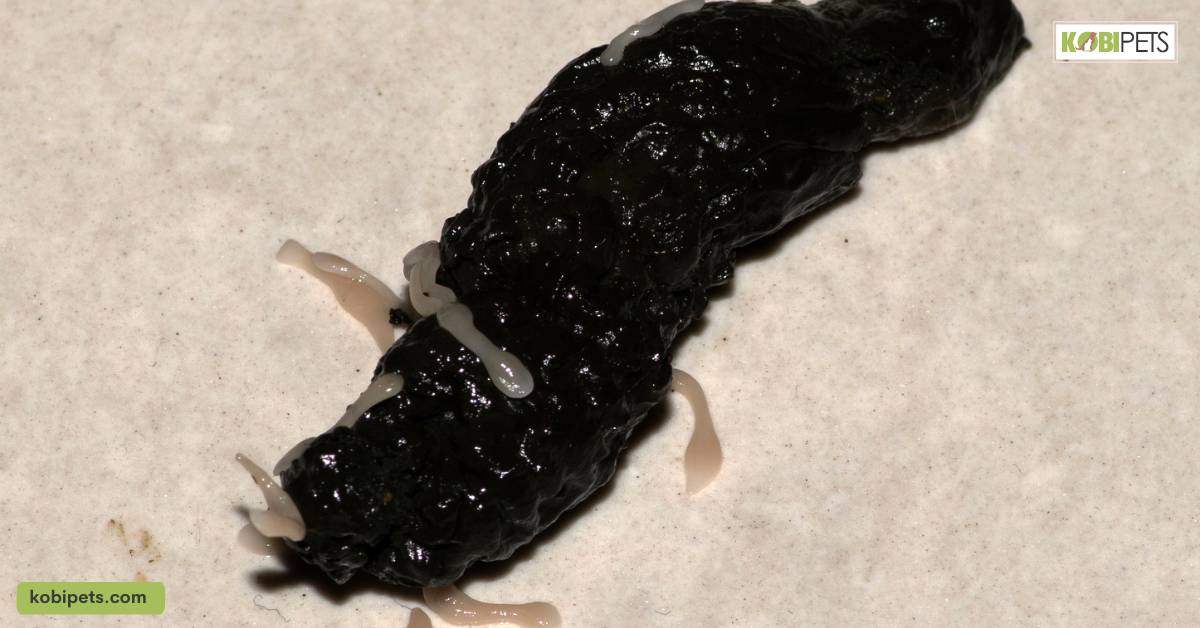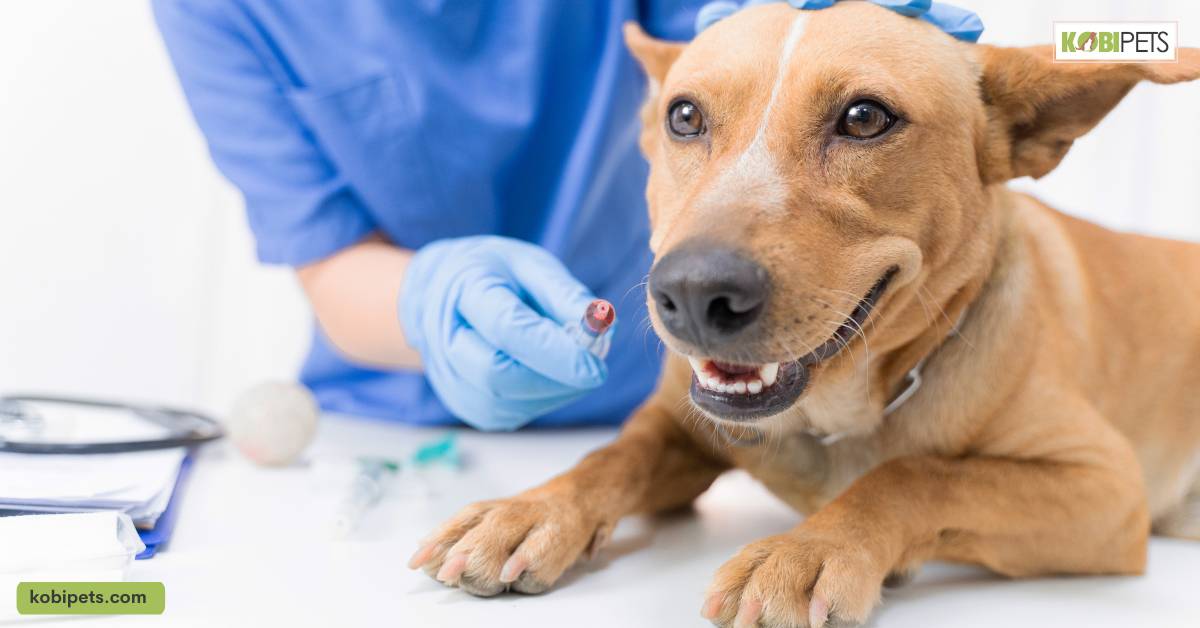Roundworms, scientifically known as “Toxocara,” are common intestinal parasites found in dogs, but they can also pose serious health risks to humans.
Roundworms are a common but treatable parasitic infection in pets. Symptoms include diarrhea, vomiting, failure to gain weight, and poor coat condition. Prevention strategies such as prompt disposal of feces and monthly deworming can reduce the risk of infection. Treatment typically involves administering medication to expel worms from the body.
What Are Roundworms?
Roundworms, scientifically known as Toxocara, are a type of parasitic worm that commonly infects pets, particularly puppies and kittens. They are long, spaghetti-like worms that live in an animal’s intestines.
Infected animals may show symptoms like diarrhea, vomiting, and weight loss. However, some may not show any signs at all, making regular check-ups vital.
Transmission typically occurs when an animal ingests contaminated soil or feces, or when puppies receive the infection from their mother through the placenta or milk.
Roundworms can also pose zoonotic risks, meaning they can be transmitted from animals to humans, though proper hygiene practices can help prevent this.
What Causes Roundworms In Dogs?
Roundworms in dogs can be caused by several factors:

What Causes Roundworms In Dogs?
- Infection from mother: Often, puppies can become infected with roundworms even before they are born, as the parasites can cross the placenta. In addition, puppies can also become infected while nursing from an infected mother.
- Ingesting contaminated substances: Dogs may get infected if they ingest roundworm eggs from soil, feces, or other objects contaminated with feces from infected animals.
- Eating an infected intermediate host: Dogs can also get infected by consuming a rodent that is already infected with roundworms.
- Post-Ingestion Migration: Upon ingestion, the roundworm larvae migrate through the dog’s body, passing through the intestines, liver, and lungs. The larvae are then coughed up from the lungs, swallowed, and finally grow into adult roundworms in the dog’s intestines.
Remember, proper hygiene and regular veterinary check-ups can play a big role in preventing roundworm infections in dogs.
Roundworm Life Cycle In Dogs
Under the subheading “Roundworm Life Cycle In Dogs”, we will delve into the fascinating yet concerning the life cycle of roundworms. The cycle begins when adult roundworms residing in an infected dog’s small intestine reproduce.
The females lay thousands of eggs daily which are then expelled via the dog’s feces. These eggs are not immediately harmful, but given favorable conditions, can become infectious within weeks and survive for years.
Dogs can encounter these perilous eggs through contaminated environments or by consuming an infected host, such as a rodent. Understanding this life cycle is key to preventing and treating infections.
Roundworms In Puppies
Puppies are extremely prone to roundworm infections. The worms can be transmitted from the mother to the pup either in utero or through her milk during nursing.
This early exposure can lead to a heavy burden of worms, which can cause severe health problems such as a pot-bellied appearance, poor growth, and even life-threatening intestinal blockage or rupture.
It’s crucial to have puppies regularly dewormed, starting from a young age, as guided by a vet. Knowledge of these risks and preventive care can help ensure your puppy grows up to be a healthy, roundworm-free dog.
Roundworm Symptoms In Dogs
While some dogs may not display any signs of a roundworm infestation, others may exhibit a range of symptoms. Here are some common indicators that your dog may have roundworms:
- Diarrhea and/or vomiting: One of the first symptoms of a roundworm infection can be gastrointestinal upset, which may manifest as diarrhea, vomiting, or both. This is due to the worms residing within the intestines.
- Failure to gain weight: Despite a good appetite, you may notice that your dog or puppy is not gaining weight as they should. This can be a sign of roundworms, as the parasites absorb the nutrients from the dog’s food.
- Poor coat condition: Dogs with roundworms often have a dull, coarse coat with dry hair due to malnutrition caused by the worms.
- Pot-bellied appearance: Particularly in puppies, a bloated, pot-bellied appearance can be a sign of a heavy roundworm infestation.
Remember, some dogs may not show any symptoms at all. The only sure way to diagnose a roundworm infestation is for a vet to conduct a fecal examination to look for worm eggs.
Roundworms In Dog Stool
If a dog is heavily infested with roundworms, you might notice these parasites in the dog’s stool. They are usually white and have a spaghetti-like appearance.
This is especially likely after a deworming treatment has been given, as the medication causes the worms to be expelled from the body. However, not seeing worms doesn’t necessarily mean your dog is free from roundworms.
A fecal examination conducted by a vet is the most reliable method to detect a roundworm infestation, as the worms’ microscopic eggs can be identified under a microscope.
Roundworm Treatment For Dogs
Treating your furry friend for roundworms is an essential step towards restoring their health and happiness. Let’s get started and help your pet live a roundworm-free life!
Initial Treatment
The first step in treating roundworms in dogs is to administer a deworming medication. Commonly prescribed medications include pyrantel and fenbendazole.
These medications work by paralyzing the worms, allowing them to be expelled from your pet’s body naturally.
Follow-Up Treatment
After the initial treatment, it’s crucial to administer a follow-up dose about two weeks later. This is because the initial treatment only kills adult worms and not the eggs or larvae.
The follow-up treatment ensures any developing worms are also eliminated, providing a complete resolution to the infection.
Monthly Preventatives
Another component of treatment is the administration of monthly heartworm preventatives, such as those containing milbemycin.
These medications have the added benefit of treating roundworms, keeping your beloved pet protected from both heartworms and roundworms at the same time.
Regular Check-ups
Regular veterinary check-ups are essential during and after treatment for roundworms. This ensures that the treatment has been effective and that your pet is recovering well.
In addition, these visits can also help prevent future infections by detecting any potential signs of re-infestation early.
Remember, the best treatment approach will depend on the severity of the infection and your pet’s overall health. Always consult with your vet to determine the most appropriate treatment plan for your pet.
Roundworm Prevention
Preventing roundworm infection is an integral part of ensuring your pet’s health and happiness. Here are some key strategies to prevent roundworm infections in both dogs and humans:

Roundworm Prevention
- Prompt Removal and Disposal of Feces: Regularly clean your pet’s living area and promptly remove and dispose of feces. This helps to minimize the spread of roundworm eggs in the environment.
- Monthly Deworming for Dogs: Keep your dogs on a monthly deworming regimen. This can significantly reduce the chance of roundworm infestation.
- Routine Deworming of Puppies: Puppies are prone to roundworm infections. Regular deworming, as recommended by a vet, is crucial from a young age.
- Prevent Dogs from Eating Rodents: Preventing your dogs from hunting and eating rodents can help reduce their risk of infection, as rodents are often carriers of roundworms.
- Good Hand Hygiene: Always wash your hands thoroughly after handling pets or cleaning up their feces to minimize the risk of zoonotic transmission.
- Avoid Contaminated Areas: Try to prevent children, who are particularly at risk of accidental ingestion, from playing in areas where pets or other animals have defecated.
Remember, roundworms are a preventable nuisance. By following these prevention tips, you’ll be well on your way to providing a safe and healthy environment for your pet and your family.
In conclusion
Roundworms are a common parasite that can cause discomfort and health issues in dogs, and they can also pose risks to humans. However, with knowledge and proactive measures, these infections are entirely preventable and treatable.
By understanding the symptoms and life cycle of roundworms, maintaining regular vet check-ups, and following the prevention strategies mentioned, you can keep your pet, and your family, safe and healthy.















